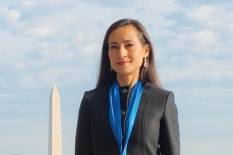First, a quiz: Look at these two photos. Which one is a Muslim and which a Jew from Brooklyn?
Too easy? Too obvious? Of course, the one on the right is the Jew from Brooklyn, my old friend Steve Kaye when he posed on the cover of Newsweek as an oil-rich Arab. The other, the Muslim, Shahzia Sikander, a world renown artist and winner of the 2006 MacArthur Foundation Fellowship, known as the genius grant. You recognized this as a setup. But suppose you met these two people, dressed as they are, boarding a plane at JFK. Without any context but your own biases, whom would you select as a seatmate?
Second quiz: Which one of these is the Stanford graduate with a degree in communications and which the college dropout?
On the right is college dropout and communications mogul Ted Turner, who took over the family’s billboard company after his father committed suicide and turned it into a mega-success. But the one on the left is no slouch. Graduated from one of the nation’s toughest and most prestigious schools, NFL cornerback Richard Sherman chose not to enter pro football when he could but to return to Stanford for an additional year working on a master’s degree. But again, picture yourself in the airport about to board a long flight. And assume they aren’t dressed in business suits, but jeans and a sweatshirt — the kind of comfortable traveling clothes I know I prefer to wear on a long trip. Which one do you want in the next seat?
You don’t have to be racist to have a bias. In fact, all of us have developed preferences, opinions, attitudes over the years. We wouldn’t be human if we haven’t. And we wouldn’t be discerning adults without the shades of perception that color the way we see the world. As my daughter constantly reminds me, “There is no point of view from nowhere.”
Our perceptions come from the world we live in. Grow up in a family where one parent is missing and the other works two or three jobs and still can’t make ends meet, your view of the world can never be the same as the person from a suburban home with two or three cars, soccer practice and a hot meal every night. These experiences have to affect the way we see the world. The whole 2012 Presidential debate about the “47 percent” and the “makers and the takers” reflects how diverse we really are — and how diverse our perspectives.
But our challenge is to broaden our perspective. To get beyond these soft biases that naturally and seamlessly cloud the way we come to conclusions.
And one final quiz: Look at these two photos and tell which one is more likely to be given the benefit of the doubt when it comes to international relations? Which one should?
One is Israeli the other is Gazan. Both are victims of terror. Both are living in desperate times. But one gets the benefit of the doubt in the minds of many. I will leave it to you to decide which.
The impetus for this blogpost came when I read a response to the venerable New York Times‘ assessment of its own coverage of the 2014 war in Gaza. The Times concluded its coverage was balanced, despite extremely challenging circumstances . Margaret Sullivan, Times Public Editor, addressing complaints about Times coverage, concluded “The Times does everything it can to be fair in its coverage and generally succeeds.” But Richard A. Block, who serves as president of Reform Judaism’s Central Conference of American Rabbis, writes in The Forward flatly: “She was wrong.” He wrote that her assessment considered only news coverage and does not consider the Times’ “worldview” which is also revealed in its editorial page, headlines and storylines, and the Op-Ed columns it chooses to run. In other words — the soft biases that the editors and even reporters may not recognize.
Without challenging our own biases — about poverty, race, money, religion, politics, really about everything that matters — how can we reasonably expect to reach valid and sustainable conclusions? How do we deserve to?





